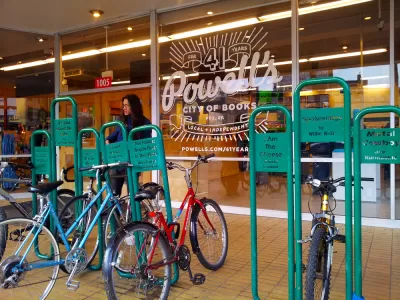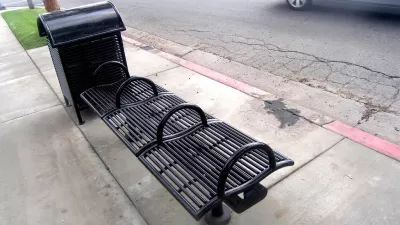In Portland, a set of mysteriously installed bike racks is prompting questions about their true purpose.

In an article in the Portland Mercury, Alex Zielinski describes “perhaps the most Portland form of ‘hostile architecture’: bike racks.” A set of 22 bike racks was mysteriously installed on a block of NW Broadway, prompting questions about who installed them and why.
“Notably, this wall of bike racks appeared in front of what appears to be a vacant, boarded-up building with no attractions that would require hoards of bike parking,” Zielinski points out. However, “It's not unusual for multiple tents and other ad-hoc shelters to line this block in particular. The city's homeless encampment reporting system shows that members of the public have repeatedly reported campers on the sidewalk that's now dotted with bike racks.”
Portland isn’t the only place where bike racks have served as an anti-homeless measure. “In 2017, Seattle's transportation department coordinated with police to install bike racks on a sidewalk shortly after sweeping a homeless camp in the area. In this case, however, it's not a city-sponsored program.” In fact, the Portland Bureau of Transportation (PBOT) was not aware of the installation. The owner of the adjacent vacant property did not respond to an inquiry about the bike racks.
FULL STORY: Portland's Newest Anti-Homeless Structures? Bike Racks.

Planetizen Federal Action Tracker
A weekly monitor of how Trump’s orders and actions are impacting planners and planning in America.

Maui's Vacation Rental Debate Turns Ugly
Verbal attacks, misinformation campaigns and fistfights plague a high-stakes debate to convert thousands of vacation rentals into long-term housing.

Restaurant Patios Were a Pandemic Win — Why Were They so Hard to Keep?
Social distancing requirements and changes in travel patterns prompted cities to pilot new uses for street and sidewalk space. Then it got complicated.

In California Battle of Housing vs. Environment, Housing Just Won
A new state law significantly limits the power of CEQA, an environmental review law that served as a powerful tool for blocking new development.

Boulder Eliminates Parking Minimums Citywide
Officials estimate the cost of building a single underground parking space at up to $100,000.

Orange County, Florida Adopts Largest US “Sprawl Repair” Code
The ‘Orange Code’ seeks to rectify decades of sprawl-inducing, car-oriented development.
Urban Design for Planners 1: Software Tools
This six-course series explores essential urban design concepts using open source software and equips planners with the tools they need to participate fully in the urban design process.
Planning for Universal Design
Learn the tools for implementing Universal Design in planning regulations.
Heyer Gruel & Associates PA
JM Goldson LLC
Custer County Colorado
City of Camden Redevelopment Agency
City of Astoria
Transportation Research & Education Center (TREC) at Portland State University
Jefferson Parish Government
Camden Redevelopment Agency
City of Claremont





























